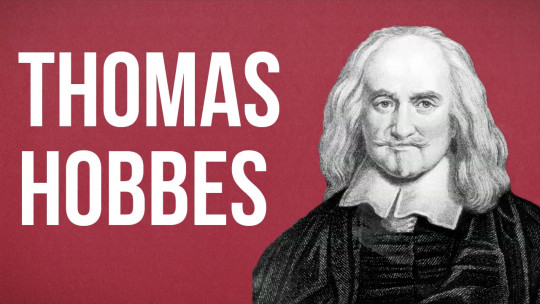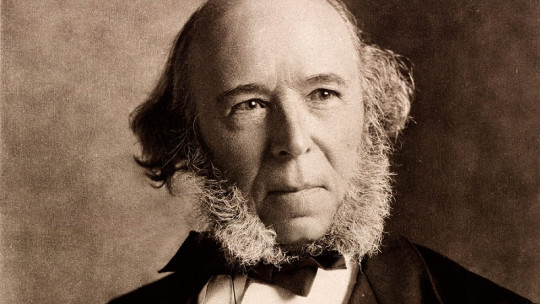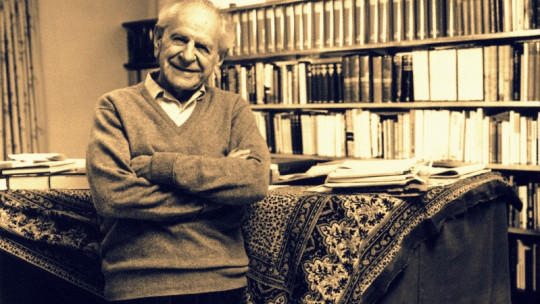Thomas Hobbes (1588 – 1679) was a prominent English philosopher who notably influenced political philosophy of modern times. Author of Leviathan (1651), in his works he explored the ethical levels that governed free market societies.
A theorist of liberalism, Hobbes left an extensive legacy in disciplines as diverse as political science, history, ethics, physics and geometry.
Quotes from Thomas Hobbes, the English philosopher
In his texts he told us about the importance of the liberal State and the limits of representative democracy.
In today’s article We will do an exhaustive review with the best phrases of Thomas Hobbes to make his philosophical and political thought more accessible.
1. Desire, accompanied by the idea of being satisfied, is called hope; stripped of such an idea, despair.
Reflection on life expectations.
2. Laughter is nothing more than the glory that is born from our superiority.
A small sample of moral and intellectual superiority.
3. The first and fundamental law of nature is to seek peace.
Without that harmony there is nothing more that can be built.
4. Eloquence is power, because it has the aspect of prudence.
Speaking well means weighing the tone and content of what is going to be said.
5. Fear and I were born twins.
With similar characteristics.
6. When men build on false foundations, the more they build, the greater the ruin.
The fundamentals of large companies, the stronger the better.
7. Man is a wolf to man.
Homo homini lupusperhaps the most famous phrase by Thomas Hobbes.
8. Life is a perpetual movement that, if it cannot progress in a straight line, develops circularly.
In continuous dynamic process.
9. This private norm to define the good is not only a vain doctrine, but it is also harmful to the public State.
An ethical reflection.
10. Idleness is the mother of philosophy.
Once we have nothing to do we can reflect on everything and nothing.
11. The basis of all great and lasting societies has consisted, not in the mutual will that men had for each other, but in mutual fear.
Respect for authority is, historically, the glue with which societies can survive.
12. After such atrocities, what can be said?
An ironic response to one of his fellow members.
13. Ideas stimulate the mind.
Creativity comes from there.
14. Favors oblige, and obligation is slavery.
When you receive a favor from someone, be suspicious.
15. When two men desire the same thing that they cannot enjoy together, they become enemies.
This is how competition works.
16. The Messiah was both things, many sacrificed goats and many escaped goats.
About Jesus Christ and his life.
17. War does not consist only of battle but of the will to fight.
What lies behind armed conflicts.
18. Julius Caesar and other emperors who came after him obtained that same testimony, that is, they were canonized as saints.
From high politics to religious veneration.
19. There are very few who are so foolish that they would rather govern themselves than be governed by others.
Having your own criteria is always preferable.
20. The inequality that now exists has been introduced by civil laws.
In the opinion of several phrases by Thomas Hobbes, law is the genesis of inequality.
21. Equal justice also corresponds to an equal application of taxes…
The rich cannot pay less, or the social contract is undermined.
22. We do not seek society for its own sake, but for the honors or benefits it can bring us.
Society helps us achieve our desires.
23. A democracy is really nothing more than an aristocracy of orators, sometimes interrupted by the temporary monarchy of an orator.
The voice of the people is rarely represented.
24. The notions of righteousness and wrongfulness, justice and injustice, have no place in war.
They are ethical variables that do not apply to war conflicts.
25. In the nature of man we find three main causes of quarrel: competition, distrust and glory.
To reflect.
26. Sometimes a man wishes to know the result of an action, and then he thinks of a similar action and of the successive results to which it gave rise, on the supposition that similar actions will follow from similar results.
One of those phrases from Thomas Hobbes in which he talks about human motivations.
27. A free man is one who, having the strength and talent to do something, finds no obstacles to his will.
It focuses directly on the target.
28. The pagans also had their saturnalias, and we have carnivals.
A form of collective redemption.
29. Those who approve an opinion call it an opinion; but those who disapprove of it call it heresy.
It all depends on the point of view, according to Hobbes.
30. But he to whom, under promise of obedience, life and liberty will then be conquered and will become a subject.
For example, with the religious or ideological yoke.
31. The submission of subjects to their sovereign is understood to last as long and no longer as he has the power to protect them.
A single requirement to be a subject.
32. Impostors do not need to study natural causes much, but it is enough for them to make use of the common ignorance, stupidity and superstition of humanity.
The modus operandi of those who do not show their face.
33. From equality of abilities arises equality of hopes in achieving our goals.
A moral maxim that is the premise of meritocracy.
34. I am about to embark on my last journey; I’m going to take the big leap in the dark.
About death.
35. Christ has not left his ministers from this world, unless they are also endowed with civil authority, no authority to command other men.
Authority is difficult to understand.
36. The leisures of rest are the fathers of Philosophy.
Another phrase from Hobbes in reference to the importance of leisure in the development of our thinking.
37. We call the fear of an invisible power, feigned by the mind or imagined from stories that have been accepted by the public, religion; if they have not been accepted, superstition.
Pertinent reflection about beliefs.
38. How can a man who has not had a supernatural revelation be sure that the one who declares that law has done so by revelation? And how can he be obligated to obey those laws?
Thought about the genesis of laws.
39. When a man, because of his natural harshness, attempts to retain what, being superfluous for him, is necessary for others, and, due to the stubbornness of his passions, cannot be corrected, he will have to be expelled from society. for constituting a danger to her.
He deserves prison, according to Hobbes.
40. When a man reasons, he does nothing other than conceive a total sum, by addition of parts, or conceive a remainder by subtraction.
About our way of thinking.
41. It follows from this that there can be no understanding of absurd and false statements – if they were universal – even though many think they understand them, when in reality they limit themselves to repeating words in a low voice or learning them by heart.
A logical reasoning about human understanding.
42. Among the diseases of a State, I will therefore consider, in the first place, those that arise from an imperfect institution and that resemble the diseases of a natural body that proceed from defective procreation.
Looking for metaphors between the health of a State and physical health.
43. So a person is the same as an actor, both on the stage and in ordinary conversation.
We all act in the way that best suits us.
44. The fear of invisible things is the natural seed of what each person calls religion for himself.
A curious conception about religions.
45. The Papacy is nothing more than the ghost of the now deceased Roman Empire.
A negative assessment of the Vatican.
46. The power of the Pope, even if it were Saint Peter, is neither a monarchy, nor does it have anything archic or cratic, but only didactic.
Another phrase about the influence of the Pope.
47. The present exists only in nature; Past things have their being only in memory; but the things that are to come have no existence whatsoever, since the future is nothing more than a fiction that the mind creates by attributing to present actions the consequences that followed from past actions.
ontological description.
48. Those men who base their knowledge on the authority of books, and not on their own meditation, are of a lower condition than the simple ignorant.
Knowledge is useless without real experience.
49. It is manifest, therefore, that men do not know, but only believe, that the Scripture is the word of God.
A critique of religious faith.
50. It is the duty of the sovereign to ensure that the people are properly instructed; and it is not only his duty, but also his benefit and the way of securing himself against the danger that may come to his natural person, arising from a rebellion.
Education as a fundamental pillar of the reproduction of state structures.
51. The appearance of property is an effect of the institution of the State.
As such, the State has the mission of safeguarding this right.
52. Good appearance is power, because, being a promise of good, it procures men the favor of women and strangers.
Reflection on the good image.
53. The canonization of saints is another religion of gentilism.
One of those somewhat tacky Christian rituals.
54. The darkest part of the Kingdom of Satan is that which is outside the Churches of God, that is, among those who do not believe in Jesus Christ.
To reflect on faith.
55. The sciences bring little power with them, because they are not very visible and cannot be recognized in any man.
Interesting reflection on the social weight of science.
56. Competition for wealth, honor, command or any other power leads to antagonism, enmity and war. Because the way a competitor achieves his desires is by killing, subduing, supplanting or rejecting whoever competes with him.
Liberalism carries with it a series of vices.
57. The truth is that the praise of ancient writers does not come from respect for the dead, but from the competition and mutual envy that takes place between the living.
It is not possible to congratulate while alive, the result of the absurd competition between writers.
58. What gives to human actions a flavor of justice is that nobility or gallantry of mind, which occurs very rarely, which makes a man despise the advantages that he could obtain in his life as a result of fraud or the breaking of a promise.
Ethics as the culmination of moral joy.
59. Churchmen prevent young people from using their reason.
They do not let their critical capacity flow.
60. Christian States punish those who rebel against the Christian religion; and all States punish those who try to establish a religion that is prohibited by them.
On the doctrinal will of all States.
61. The Greeks have only one and the same word, logos, to mean language and reason.
There must be a reason why they speak with the same voice.
62. Influential individuals always have difficulty digesting doctrines that establish a power capable of curbing their whims.
They always desire more and more.
63. Those in charge of government must be careful not to indirectly approve what they directly prohibit.
Done the law done the snare.
64. Men do not find pleasure, but great suffering, in living with others where there is no power capable of terrifying them all.
According to Hobbes, man needs clear rules to live in peace.
65. But it is not the author, but the authority of the Church, that makes a book a canonical text.
Authority emanates from power, not from the author’s unique and mystical vision.
66. Be conciliatory with your adversary while you share the road with him, lest he hand you over to the judge, and the judge to the bailiff, and you be put in prison.
A great lesson to avoid getting absurdly trapped.
67. No man can know infallibly, by natural reason, whether another has had a supernatural revelation of the will of God; he will have only one belief.
Reflection on the mystical life.
68. No injustice can become a standard of judgment by which subsequent judges are guided.
Jurisprudence must be limited to manifestly just cases.
69. There is no man who can have a thought or representation of something that is not subject to the sensory order.
Only perception gives us instruments for our imagination.
70. Originally, tyrant simply meant monarch.
For some reason the meaning was mutating.
71. Curiosity is the lust of the mind.
A poetic way of defining it.
72. Hell is the truth seen too late.
Many of us have experienced this very specific sensation.
73. Knowledge is power.
Knowledge allows us to achieve everything we set out to do in life.
74. Life is unpleasant, brutal and short.
One more example of his negative view of the world.
75. Force and fraud are the two cardinal virtues in war.
War was one of the topics that this great English philosopher was most passionate about, as it was the maximum expression of human evil.
76. The condition of man. . . It is a condition of war of all against all.
Famous is Hobbes’s negative notion about the nature of the human race.
77. By consequence, or series of thoughts, I understand that succession from one thought to another which is called, to distinguish it from speech in words, mental speech.
Mental speech is the flow of our thoughts and ideas in the mind.
78. The source of all crime is some defect of understanding; or some error in reasoning; or some sudden force of passion.
Hobbes reflected on any social phenomenon and especially on the evil of human beings.
79. Words are the chips of the wise and the money of the fools.
Fools spend them and wise people invest them.
80. Give an inch, he will take an elbow.
Some relationships between friends are like that.
81. The fear of invisible things is the natural seed of what each one in himself calls religion.
A good way to explain ancient myths turned into religious tradition.
82. What is the heart but a spring, and the nerves but so many cords, and the joints but so many wheels, which give movement to the entire body?
Hobbes set out to explain each and every one of the phenomena of human nature, both physical and psychological.
83. “True” and “false” are attributes of speech, not of things. And where there is no word, there is neither ‘truth’ nor ‘falsehood’.
What is not named does not exist.
84. Because, since the Bishop of Rome had become recognized as a universal bishop, under the pretext of the succession of Saint Peter, his entire hierarchy, or kingdom of darkness, can not unduly be compared with the kingdom of the fairies.
Hobbes, like most thinkers of his time, was truly critical of the Catholic Church.
85. It is often with fraudulent design that men nail their corrupt Doctrine with the Nails of Ingenuity of other men.
We must be wary of the indoctrination of other people who try to proselytize their beliefs.









